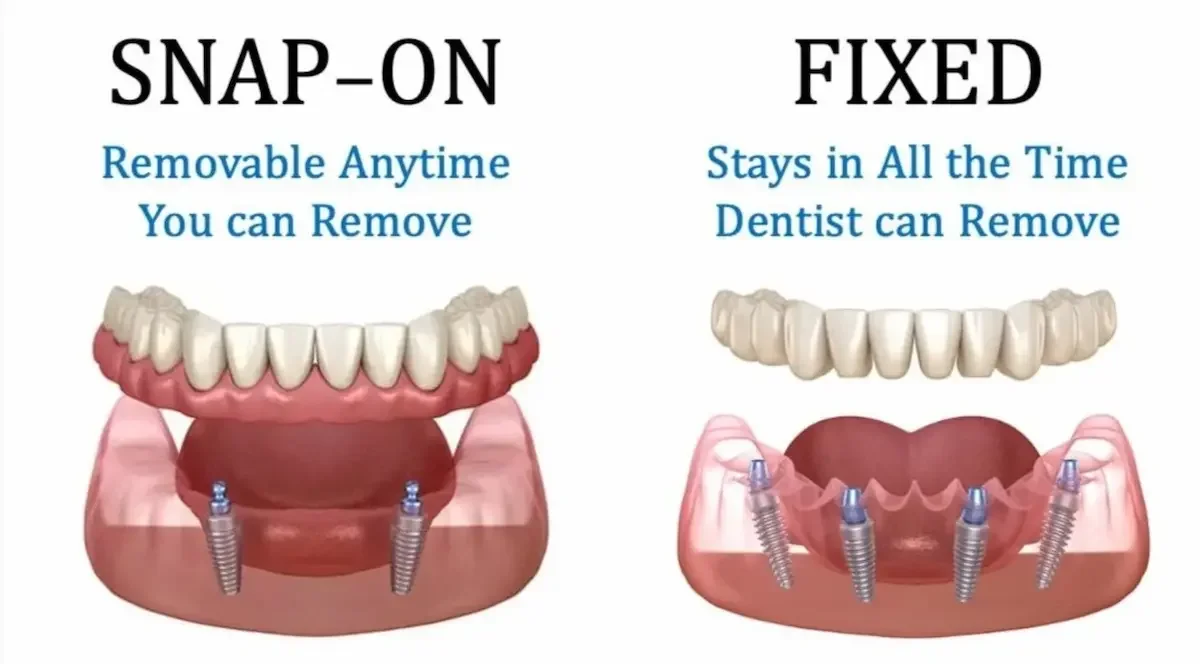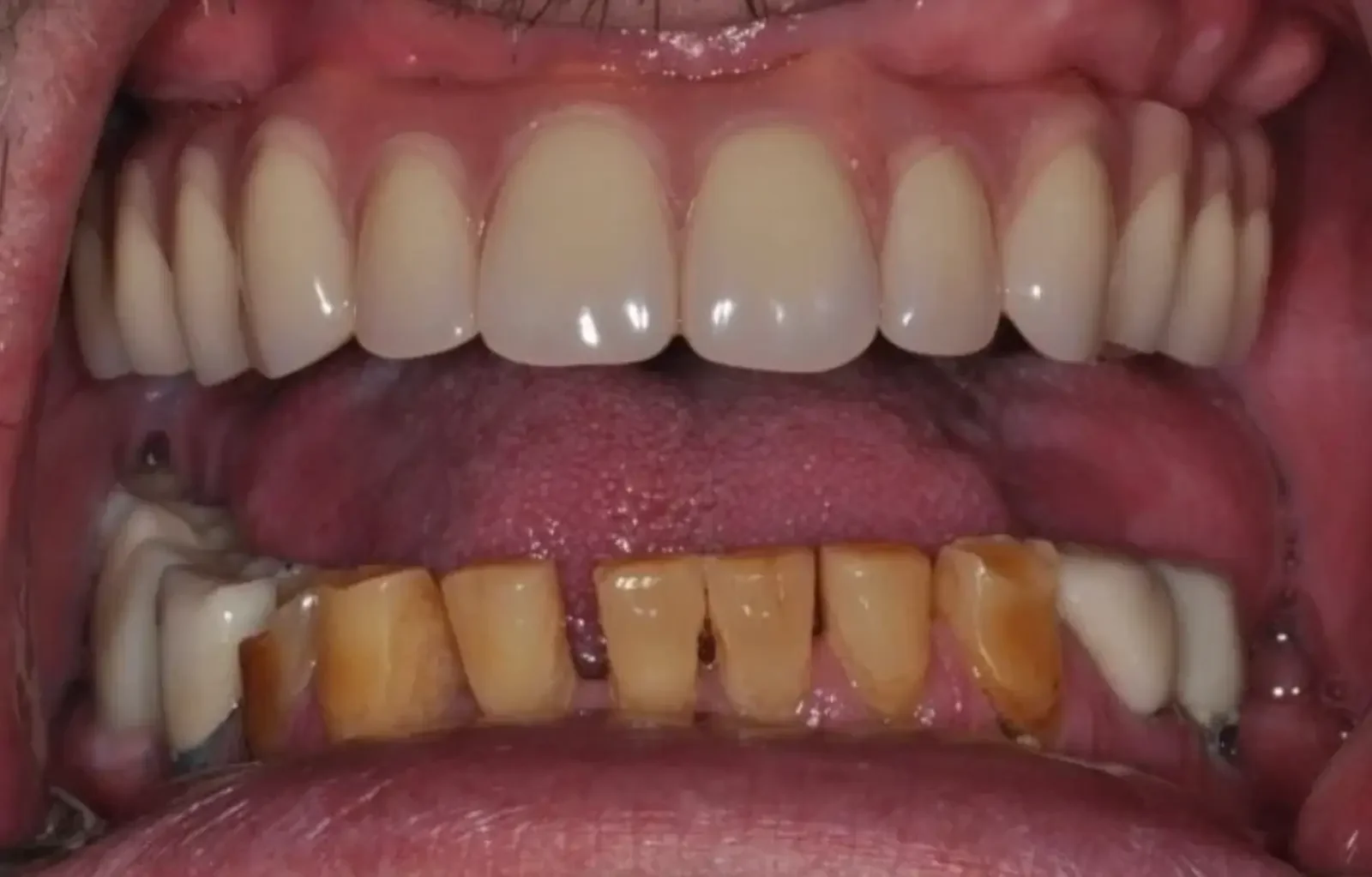Implant Supported Dentures Explained!
Don’t lose your denture like Mrs Doubtfire!
Jump to a Section
- Introduction
- Types of Dentures
- Traditional vs Implant-Supported Dentures
- Advantages of Implant-Supported Dentures over Traditional Dentures
- The Most Famous Dentures Of All Time!
- Why NOT to Get Implant Supported Dentures
- Timeline for Getting Implant-Supported Dentures
- A Real example of the whole process
- How many implants do I need?
- Conclusion
Introduction
Remember the movie Mrs. Doubtfire? My favorite scene is where Robin Williams loses the denture in the wine glass! This is what used to come to mind when I heard the word “dentures”. And in the past, this was accurate. Thankfully, we’ve come a long way from the Mrs. Doubtfire days!
Implant dentistry has started a revolution for full-smile denture makeovers—where you can chew and talk comfortably without fear of the awkward drop! Implant-supported dentures are also much easier to maintain, often without the need to remove them at night.
We’ve had a lot of patients from all around the Fox Valley benefit from implant-supported dentures. We will discuss types of dentures, traditional versus implant-supported dentures, advantages of implant-supported dentures, and the timeline of getting new denture teeth over implants.
(Ever heard of “teeth in a day”? Read more below!)
BONUS: A real patient at our practice who got top and bottom implant supported dentures. What went wrong, and how we fixed it. Click the button below to see the full case break down!
A REAL Implant Denture case from St Charles, IL. Dr Brayden details the whole thing in the video and on our new blog.
Types of Dentures
There are two main denture categories: full dentures and partial dentures. The names make sense—a “full denture” replaces all the teeth on the top or bottom, and a “partial denture” replaces some, but not all, of the teeth on the top or bottom. Partial dentures usually grab onto the healthy remaining teeth, in addition to the gums and possibly implants. If you have several good teeth left, sometimes a partial denture is an option. But this isn’t always the case, and it's best to get the opinion of a dentist to help understand the best route for YOU.
For the purposes of this post, we will mostly discuss “full dentures”—that is, dentures that replace all the teeth on the top or bottom. But if you have questions about partial dentures, let us know! We are happy to help!
Traditional vs Implant-Supported Dentures
Traditional dentures, like Mrs. Doubtfire’s, get their support from the gums and palate tissue. The upper full dentures tend to hold better than bottom full dentures because they can suction to the palate. Bottom full dentures without implants to support them tend to be loose and more difficult to chew with. Patients are often frustrated by how little use they are for chewing. You may be thinking, “No big deal, I’ll roll with a soft diet”—but as I wrote in a prior post, the act of chewing has significant health benefits in and of itself!
Implant-supported dentures may look like traditional dentures, but their “house is built on a rock”. Multiple dental implants anchor the denture to the jaw, providing far superior chewing stability. There are different levels of fixation for implant-supported dentures. One option is to attach like buttons to dental implants. Sometimes these are called “snaps” or “snap-ons”. In this case, the denture can be taken in and out easily by the patient but often provides lesser chewing efficiency than dentures that are fully fixed to the implant.
Advantages of Implant-Supported Dentures over Traditional Dentures
Rock-Solid Stability: Say goodbye to wobbly dentures! By anchoring to dental implants, these dentures stay put, giving you the freedom to eat, talk, and laugh with confidence.
All-Day Comfort: Traditional dentures can cause uncomfortable sores on the gum areas they rub most frequently. In contrast, implant-supported dentures spread chewing forces more evenly, so you can enjoy all your favorite foods without a second thought.
Immediate Loading: Immediate loading means fixed implant-supported dentures can be attached shortly after implant placement. You can walk out of the office with a brand-new smile in a single day! (more on this below)
Boost Your Oral Health: Unlike traditional dentures that can speed up bone loss, implants stimulate jawbone growth, keeping your jaws and smile strong and healthy for the long haul.
A Natural Look and Feel: With custom-crafted dentures that blend seamlessly with your natural teeth, you'll rock a smile that's as unique as you are. Say hello to newfound confidence! Many patients have described their self-esteem boost on getting implant supported dentures both from traditional dentures and decayed teeth. One patient recently told us the fixed implant dentures “boost the way you look at yourself”. An increase in self esteem is priceless.
Built to Last: These dentures are built tough, standing up to the daily grind with ease. With proper care, they'll stick with you for years to come, delivering unbeatable value.
Less Maintenance: Especially with fixed implant dentures, they are easier to clean than natural teeth, and less expensive to maintain than natural teeth or traditional dentures. Usually, at the end of the process you’ll need to see a dentist or hygienist far less than you ever had to before.
TMJ Issues Solved: The dentures allow for a whole new bite. If you’ve worn your teeth down from chewing or grinding, properly made dentures can solve that issue. Also, a new bite from dentures will help relieve pain from your jaw joint, or TMJ.
Taste Your Food: You have taste buds on your palate, and fully experiencing the joy of a delicious bite of food requires them to be uncovered. But traditional dentures cover the palatal tissue. Implant supported dentures leave the palate open, and free to taste!
Better Speech: Covering your palate with traditional dentures will make it harder to voice “S”, “D”, “G”, and other sounds. Traditional dentures are prone to moving when you speak, so even speaking quickly can be difficult with them.
Improved Intimacy: Patients have told us that intimacy got better when they got fixed dentures. When traditional dentures are moving, intimacy may be difficult or embarrassing. You can decide whether this is an issue!
The Most Famous Dentures Of All Time!
Fun Fact: Did you know George Washington’s dentures were NOT made of wood?
Why NOT to Get Implant Supported Dentures
Implant Dentures aren’t for everyone! Here’s why you may not want them:
Financial investment: Implant surgery fees increase the price of implant supported dentures, as do the necessary parts, time, and expertise associated with fixing a denture to implants. Flexible payment options are always available, but may not be enough for some budgets. However, staying in the “immediate” healing denture for longer allows patients to spread the investment out over longer lengths of time. (More info on implant timeline here)
BONUS 👉: Our Real Prices and PRO TIPS to save you money on dental implants!
Surgery: The implant surgery itself can make some people anxious. We understand that. Dental anxiety is really common! Sometimes nervousness prevents people from pursuing implants. Read Dr Brayden Teuscher’s blog on possible complications from dental implant surgery. Complications can happen, but are rare.
Sidenote: If you are nervous for surgery, many of our patients have found oral sedation to be really helpful. That also isn’t for everyone, but you can read more about it here: Oral Sedation blog post
How long do implants take to heal?
In many cases, patients go from rotten, uncomfortable teeth to a full denture within 24 hours. Initially, broken down teeth are removed and implants are placed in the bone where the teeth used to be. Right away, an impression or scan can be taken and a denture can be made overnight to fit over the implants. Usually this new denture is put on the next day. This is called an “Immediate Denture”.
Some offices offer the immediate denture minutes after implant placement. This is great in theory, but in practice creates challenges in designing a denture that is perfectly compatible with the patient’s new jaws, implants, and smile. Be cautious of advertisements suggesting otherwise.
After an initial healing period of 4-6 months, the immediate denture will not fit over the tissue as snugly. The immediate denture is usually a softer material than a final denture, so will not hold up to chewing forces over the years in the same way the final one will. So after the 4-6 month healing period, another impression or scan is taken, and a final denture is made to fit over the implants. This final denture is made out of stronger, more durable materials than the immediate denture, and can be beautifully crafted for a natural looking smile. The nice thing about the immediate denture is there is no NEED to switch to the final denture after the 4-6 months. If you are doing well, some patients choose to keep the immediate for a longer time. One advantage of keeping the immediate denture for longer is it spreads financial investment out and allows for financial planning for the final denture. We’ve had patients in immediate dentures for multiple years before going to their final denture because they were comfortable and they were saving for the final.
Check out our recent blog post for more information on dental implant timeline. It doesn’t specifically cover dentures, but will give more detailed information.
BONUS: More info on Dental Implants versus Alternative Options
Timeline for Getting Implant-Supported Dentures
The process of getting implant-supported dentures typically involves several steps:
1. Consultation and Planning
Teuscher Legacy Dental’s expert team will evaluate your oral health, take necessary imaging, and develop a treatment plan tailored to your needs.
2. Implant Placement
Dental implants are surgically placed into the jawbone. In some cases, immediate loading allows for the placement of temporary dentures on the same day.
3. Healing Period
Over the next few months, the implants integrate with the jawbone in a process called osseointegration.
4. Final Denture Placement
Once healing is complete, your custom-made dentures are securely attached to the implants, restoring full function and aesthetics.
Below is an example of the whole process:
Before Any Treatment
Immediate fixed denture less than 24 hours after implant placement
Final Implant Supported Denture, 6 months after the implant surgery
How many implants do I need?
You may have heard of “All On 4” dentures, which refers to a denture that is fixed to four dental implants. This type is not removable, and it’s a popular buzz phrase recently. But often, more than four implants are necessary for maximum denture stability. Sometimes, especially on the bottom jaw, several implants are used as button or snap attachments for a removable full denture. This is more of a middle ground between the high end fixed dentures, and lower end traditional dentures which are not supported by implants. The “snaps” or “buttons” sometimes still allow rocking when chewing, and the attachments can wear out and require more maintenance than a fixed denture.
Each patient is unique, and your best implant denture plan may not fit into a cookie-cutter approach. That’s where we can help you decide what’s best for your situation!
Frequently Asked Questions About Implant-Supported Dentures
How long do implants take to heal?
Most dental implants require about 3–4 months to fully integrate with the jawbone. Healing time can vary depending on bone quality, whether grafting was needed, and overall health. During this phase, many patients can wear a temporary denture.
What is the difference between implant-supported dentures and traditional dentures?
Traditional dentures rest on the gums and rely on suction or adhesive, while implant-supported dentures are anchored to dental implants. Implant support improves stability, comfort, chewing efficiency, and bone preservation.
How many implants do I need for implant-supported dentures?
The number depends on the type of denture and whether it is for the upper or lower jaw. Many lower overdentures use 2–4 implants, while upper dentures often require 4 or more implants for proper support.
How long does the entire implant denture process take?
From initial consultation to final teeth, the process often takes 4–8 months. This timeline may be shorter or longer depending on extractions, bone grafting, and healing needs.
Can I get teeth the same day as implant placement?
In some cases, a temporary fixed or removable denture can be placed the same day as implant surgery. Final teeth are typically placed after healing is complete to ensure long-term success.
Are implant-supported dentures right for everyone?
Not always. Factors such as medical conditions, smoking, bone loss, and financial considerations can affect candidacy. A consultation with imaging (such as a CBCT scan) is necessary to determine the best option. If you aren’t sure, our team can help you think through options!
Do implant-supported dentures look natural?
Yes. Modern implant-supported dentures are custom designed to match facial features, smile shape, and bite, resulting in a very natural appearance and improved confidence.
Conclusion
Implant-supported dentures offer a stable, comfortable, and natural-looking solution for those seeking to improve their smile and oral health.
If you're considering this option, schedule a no-charge consult with Teuscher Legacy Dental to determine the best treatment plan for you. Teuscher Legacy Dental has helped lots of people like that in St. Charles, Geneva, and Campton Hills, Illinois. Give us a call or text!
- Dr Brayden Teuscher
P.S. - If you’re interested in a free consultation to go over your options (no obligation or costs!) Click Here to Schedule Online.







